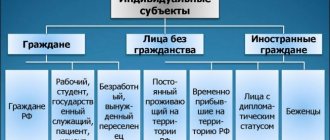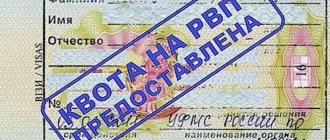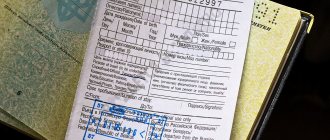The concept of administrative expulsion - what does expulsion from the Russian Federation mean?
Administrative expulsion from the Russian Federation is the process of forced transfer of a foreigner or stateless person outside the country.
As a rule, this is an independent exit from the country, which is controlled by the migration service. A preventive measure in the form of administrative expulsion is prescribed by a judge in cases of administrative offenses committed by persons during their stay in Russia, and in other cases provided for by Russian legislation. Next, we will talk in detail about all the grounds for deportation, the types of administrative deportation, how deportation differs from deportation and readmission, as well as whether deportation can be reversed and where to get help when appealing a decision on administrative deportation from the Russian Federation.
To move around the page more conveniently, you can use section navigation:
- Readmission, deportation and expulsion - what's the difference?
- What is the difference between deportation and expulsion from the Russian Federation?
- What is the difference between readmission and expulsion from the country?
- Law on the expulsion of foreign citizens from the Russian Federation
- Types of administrative expulsion - independent and forced expulsion
- The procedure for expelling foreign citizens from the Russian Federation
- Deadline for expulsion of foreign citizens from the Russian Federation
- Grounds for expulsion of foreign citizens from Russia
- Court ruling on expulsion from the territory of the Russian Federation
- Execution of decisions on administrative expulsion
- Administrative expulsion, entry ban
- Expulsion of minor foreign citizens from the Russian Federation
- Cancellation of administrative deportation
- Appeal against a deportation order
- Sample appeal for expulsion
- Consequences of deportation from the Russian Federation
- Amnesty for expulsion
- How to check the expulsion of foreign citizens
- Assistance in deportation of foreign citizens
The concept of deportation and the grounds for application
Let's start with the terms and find out what expulsion and deportation are. The definition of the second concept is contained in Federal Law No. 115-FZ of July 25, 2002. In accordance with this regulatory act, deportation is one of the mechanisms by which the state fights illegal migration.
The procedure is the forced expulsion of a foreign citizen from Russia if he has no legal grounds for staying here.
A ban on staying in the Russian Federation may be imposed on a violator of the migration regime in the following cases:
- There is no issued work permit - for foreign citizens from countries with which the Russian Federation has a visa regime.
- There is no residence permit or temporary residence permit for persons who are trying to obtain Russian citizenship.
- There is no labor patent or its validity period has expired - for foreign citizens from countries with which the Russian Federation has a visa-free regime.
- The end of the legally permitted period of stay in the Russian Federation or an expired visa - for all other categories of persons.
Failure to comply with the above conditions serves as grounds for applying the procedure for deportation of the visitor. It is not a punishment, it is just one of the ways to protect the state from such a phenomenon as illegal migration.
Readmission, deportation and expulsion - concepts and differences
At first glance, deportation, administrative expulsion and readmission look like similar processes, since as a result of each, a foreign citizen must end up outside of Russia, but in reality these are completely different procedures, decisions about which are also made by different government agencies.
What is the difference between deportation and administrative expulsion - differences between expulsion and deportation
First, let's look at what deportation and administrative expulsion are. These procedures are carried out on different grounds, and the process itself is also different. So, what is the difference between the basis for both procedures:
- Forced deportation, being an administrative punishment, can only be imposed by a court order based on a court decision.
- The decision on deportation is made by an official of the migration authority of the Russian Federation or a border guard of the FSB of the Russian Federation. The court, unlike the case of deportation, does not make such a decision.
In other words, the difference between deportation and administrative deportation is that decisions are made by different bodies - administrative deportation from the country can only be ordered by a court decision, and the decision on deportation can be made by an official.
That is, forced administrative expulsion is a punishment for violating the rules of a migrant’s stay on the territory of the Russian Federation. Therefore, it is carried out only in cases where the guilt of a foreign citizen or stateless person in committing an offense is proven.
This means that before the deportation procedure, many procedural actions are carried out, on the basis of which the court subsequently makes a decision on punishment in the form of deportation from the state borders of Russia.
How does the readmission procedure differ from administrative expulsion - differences between readmission and expulsion
Despite some similarities, readmission is fundamentally different from administrative expulsion from the Russian Federation.
Firstly, readmission, unlike expulsion, is not an administrative punishment for offenses. Readmission is a procedure in which a foreign state accepts back its citizens who were illegally on the territory of the Russian Federation. Readmission is one of the mechanisms to combat illegal migration.
One of the most important conditions for readmission is the preservation and protection of the rights and interests of citizens who are subject to the procedure.
In this case, the decision on readmission is authorized to be made by the migration service, and this decision cannot be appealed.
Rules for minors
According to the current legislation of Russia, only persons over 16 years of age can be held accountable for administrative violations.
Due to the fact that deportation is considered an administrative punishment, a minor can be assigned this measure of influence only if at the time of the commission of the offense he was already 16 years old. Read also: Resettlement program to the Far East in 2021
Clause 9 of the Convention on the Rights of the Child indicates that it is possible to separate a minor from his parents only in exceptional cases and only in the interests of the child. In connection with this requirement, a decision on the deportation of a foreigner living on the territory of the Russian Federation together with minor children can be made only when such a penalty is the only possible one. However, the decision on deportation does not apply to a minor.
Legislation regulating issues of expulsion of foreign citizens from the Russian Federation
As such, there is no single law on the expulsion of foreign citizens, since everything related to foreign citizens, including issues of administrative expulsion, is regulated by the following laws:
- Code of the Russian Federation on Administrative Offenses (COAP);
- Federal Law No. 115-FZ “On the legal status of foreign citizens in the Russian Federation”;
- Federal Law No. 114-FZ “On the procedure for leaving the Russian Federation and entering the Russian Federation”;
- Federal Law No. 410-FZ “On Amendments to the Federal Law “On Bailiffs” and Certain Legislative Acts of the Russian Federation”;
- Decree of the Government of the Russian Federation No. 382 “On placing a mark on the prohibition of entry into the Russian Federation of certain categories of foreign citizens and stateless persons”;
- Order of the Ministry of Internal Affairs of Russia and the Federal Migration Service of Russia No. 758/240 “On the organization of activities of the Ministry of Internal Affairs of the Russian Federation, the Federal Migration Service and their territorial bodies for the deportation and administrative expulsion from the Russian Federation of foreign citizens or stateless persons.”
The concept of expulsion and the grounds for its application
To understand how deportation differs from expulsion from the country, you need to find out what deportation is.
The definition of this term is contained in Article 3.10 of the Code of Administrative Offenses. This is a type of administrative responsibility, which consists of the forced movement of foreigners who have committed certain offenses across the Russian state border or the voluntary controlled departure of such migrants outside the Russian Federation. That is, expulsion is a measure of responsibility/punishment for violating the law; the procedure for its application is described in detail in Art. 34 of the Federal Law "".
Reasons for forced expulsion may include:
- violation of the established border crossing procedure;
- violation of the regime of stay in the country;
- sale, storage, transportation of narcotic substances;
- failure to comply with already imposed administrative penalties and other administrative offenses.
“Every coin has two sides,” let’s try to determine the similarities and differences between deportation and administrative expulsion.
Distinctive properties can be formulated as follows:
- deportation is a way to control migrants, expulsion is a type of punishment;
- The first procedure is most often carried out voluntarily, the second is compulsory.
The similarity lies in the final result: a visiting citizen in any case must leave Russia.
Types of administrative expulsion
There are two types of administrative expulsion of foreign citizens from the Russian Federation - the so-called independent expulsion and forced:
- When an expelled foreigner leaves the country's borders voluntarily, but under control. In this case, the person independently travels beyond the borders of the Russian Federation under the control of representatives of the Internal Affairs Directorate of the Ministry of Internal Affairs. If a migrant suddenly tries to ignore the decision on deportation, then he is subject to penalties and is subject to forced deportation.
- The second type, accordingly, is forced deportation from the Russian Federation. Forced supervised deportation is assigned, as a rule, to those who have committed an offense twice in a year, that is, for a recidivism. Until leaving Russia in such cases, the person punished is kept in a specialized center.
What is expulsion?
Administrative punishment is often confused with deportation.
, provided for in clause 7, part 1, article 3.2 of the Code of Administrative Offenses of the Russian Federation. Expulsion is a punishment imposed for various offenses (for example, Article 6.8 of the Code of Administrative Offenses - illegal trafficking of prohibited substances). In essence, expulsion is when a person is told that his stay in the country is undesirable. The penalty may consist of either forced expulsion or controlled departure by the person himself.
Important! The decision on deportation is appealed before the decision enters into legal force, on deportation - after
.
Administrative deportation and entry ban - is an entry ban imposed after deportation from the Russian Federation?
After administrative expulsion, a migrant may receive a ban on entry into the Russian Federation from a number of departments, such as the Main Directorate for Migration of the Ministry of Internal Affairs, the Ministry of Internal Affairs, the Ministry of Justice, and the FSB.
These services can prescribe either a complete ban on entry into Russia, or a Decree on the undesirability of the foreigner’s stay in the country.
There can be many reasons for enacting one of these restrictions. These are mainly the consequences of violating Russian legislation.
Some of the possible reasons:
- Exceeding the period of stay in Russia
- Two or more offenses in one year
- Falsification of documents when entering the country
Important!
After the procedure of administrative expulsion from the Russian Federation, the entry ban is valid for 5 years.
Important!
You can find out about restrictions on the entry of a foreign citizen into the territory of the Russian Federation on the official website of the Ministry of Internal Affairs of the Russian Federation. To verify such information, you will need to enter your full name, passport details, date of birth and citizenship.
Who do they want to evict from the country in 2021?
When information reached the population that a planned deportation of Russians was imminent, a pronounced wave of indignation arose. According to the Russian tradition, people did not understand the nuances, but transmitted the information received with additional fictitious details, sowing panic among citizens.
Many people post information online that V.V. Putin signed a law on the deportation of all “under-citizens”, but they do not bother to immerse themselves even a little in reading the official document that caused such a wave of popular indignation. In particular, one of the articles of this law considers the details of the categories of deportees.
The list of such persons is wide:
- Individuals who initially provided false information about themselves, their place of birth, etc., including those who received a Russian Federation passport on the basis of such data.
- Residents of the USSR who received documents before July 1, 2002, who lost their Russian passport after receiving it, and did not bother to re-issue documents.
- Former citizens of the USSR living on the territory of the Russian Federation who received a passport of the Russian Federation before November 1, 2002, but changed their last name and ignored receiving a new document.
- Persons from point No. 3 who missed the deadline for exchanging a document upon reaching a certain age.
- Individuals from among the former residents of the republics who lost all their documents, did not declare this and did not receive a new passport and birth certificate according to data from the archives.
We are talking about several thousand fellow citizens who remained to live on the territory of the Russian Federation or who came here before the end of 2002, but did not fulfill the conditions for fully registering their status. Deportation of citizens of the Russian Federation who have the appropriate documents is not implied, although there are reservations here too. In particular, people who have a valid Russian passport, but are found to have previously provided false information, will be deprived of the right to stay in the country. However, there are many different conditions and nuances that require an individual approach; only some individuals have their own opinion regarding what is happening.
Cancellation of administrative deportation - is it possible to appeal and cancel deportation from the Russian Federation?
In 2021, administrative deportation can be cancelled, suspended or appealed, but only in court.
The best way is to declare special circumstances or petition not to impose such a penalty on the first day of the case in court.
If the court has already decided to leave the borders of the Russian Federation, then it is necessary to file an appeal to a higher court.
The period for appealing the decision in this case is 10 days. During this period, if the complaint is filed correctly, the foreign citizen has the right not to leave Russia.
Can I appeal against deportation or expulsion?
A decision made by the GUVM or a court can be challenged. The expulsion is being appealed to a higher court
, and the application is not subject to state duty. A petition to cancel a previously issued decision is considered promptly - in just 5 days.
You can appeal the decision on deportation either to a higher authority of the Main Directorate for Migration Affairs or to a court
. You need to pay 300 rubles of state duty to submit an appeal. The official is obliged to consider the application within 1 month from the date of its receipt.
By the way! Check travel ban
in the Russian Federation, a foreigner can visit the website of the Ministry of Internal Affairs. For the convenience of foreigners, all fields are filled in only one language - Russian, of course.
Appealing administrative deportation - how to file a complaint against deportation
After the court ruling is issued, it is possible to appeal the deportation within 10 days.
A complaint against administrative expulsion must be filed with the court that issued the order. If the appeal against deportation is drawn up correctly, the case materials are then transferred to a higher court, where the appeal hearing takes place.
Along with the application to cancel the administrative deportation, it is necessary to indicate the details of the contested decision, describe the details of the offense committed and also document the arguments in favor of canceling the administrative deportation from the Russian Federation, such as a marriage certificate with a citizen of the Russian Federation, a certificate from a university in the case of studying, or other documents evidencing in favor of repealing the decision.
All documents must be notarized. And documents of foreign origin are translated.
If a higher court rejects the application as a result of an appeal, the foreign citizen is obliged to leave Russia within the next 15 days after the decision is made.
Consequences of administrative expulsion from the Russian Federation
Administrative deportation has very serious consequences for a foreign citizen or stateless person - along with deportation, the person is also subject to a ban on entry into the Russian Federation for a period of 3 to 10 years.
If an entry ban was prescribed for a period of 5 or 10 years, after this period a person can no longer apply for Russian citizenship, a residence permit, or even a temporary residence permit.
A foreigner is prohibited from entering for a period of three years if he stays on the territory of Russia for 4 months, as well as for being brought under the Code of Administrative Offenses two or more times in one year.
The reasons for deportation with a 5-year ban can be very different. Among them:
- Unexpunged criminal record in Russia or in another state
- Multiple tax evasion
- Presenting false documents when entering the country
- Exceeding the permissible period of stay on the territory of the Russian Federation
Different people's opinions about the law
Blogger Evgeniy Pupyrin caused the greatest turmoil online. A video with an exaggerated presentation of information shook the Internet, and the video itself began to spread across social networks, driving people into panic. In fact, the video contained only excerpts from Federal Law No. 62 as amended at the end of December 2021, without any additional explanations or conditions. At the same time, the main essence remained behind the screen of these unilluminated legislative nuances.
At Evgeniy’s instigation, thousands of citizens began to truly believe in the extreme dishonesty of the authorities, spreading misinformation further. Although a number of lawyers, including Vladislav Porvatkin, argue that because of this not entirely reliable video, there was confusion, people simply did not receive the information in full. If we look at the law in detail, we can see that those who want to stay in Russia and do not ignore local rules, with rare exceptions, have the right to stay here. Those who promptly exchanged their Russian passport, but do not have a residence permit in another country, as well as children who have citizenship of another state, can remain on the territory of the Russian Federation without any problems even after 01.04. 2021, the date specified in the deportation law.
Due to the abundance of fake news, a bill has recently been considered that would impose financial penalties for the dissemination of false information. It won’t come down to private “gossip” and correspondence on social networks, but official media, blogger posts and videos with false information can be fined up to 1 million rubles.
With the help of the Internet, persons subject to deportation have acquired a new status. Now online they are called citizens of the world, because... Many people do not understand where and how such individuals will be expelled. The law on the deportation of Russians in 2021, which has so excited people, is taking place, but not in the form it was presented on the Internet. In essence, with this decree, the authorities are trying to restore order to their own documentation, which takes into account the real number of residents of the country who have the right to legally stay in the territory of the Russian Federation.
In fact, there are entire layers of people who live half their lives without documents or with a passport that has lost legal force due to an untimely change in age or the appearance of a new surname. Even now there are people who do not have any documents in the third generation, but now issues related to people’s missing documents have been taken seriously. However, it is unknown what will come of this, because we live in a country where even good initiatives can be implemented in a not very high-quality manner.
Amnesty for expulsion
An amnesty for foreign citizens implies the abolition of responsibility for offenses committed on Russian territory.
An amnesty removes restrictions imposed on a migrant, such as deportation, expulsion or a ban on entry. Amnesty for migrants is a bill or by-laws that are formed by authorized government bodies, for example, the Ministry of Internal Affairs or the State Duma of the Federal Assembly of the Russian Federation. For example, from the beginning of 2021 another migration amnesty is taking place. This time, among those who will receive it are foreign citizens who have violated Article 27 of the Federal Law on the rules of exit and entry into the borders of Russia.
You can find out about the availability of an amnesty on the official websites of departments.
Features of deportation
Deportation is a method of forcibly relocating a foreign citizen back to his homeland.
Peculiarities:
- The decision can be made by a security officer or the Federal Migration Service of the Russian Federation.
- The foreign citizen is not present when the decision is made by the authorized body.
- Violation of the law on the territory of Russia by a foreign person resulting in deportation can be imposed at any time after the crime is disclosed. Accordingly, the procedure has no statute of limitations.
- You can appeal a verdict outside of court at any time. Through judicial proceedings, you must submit an application no later than 90 days.
- After the verdict is announced, the violator is obliged to leave the Russian Federation within the next 5 days. It does not matter whether an appeal is filed or not.
- Cancellation of deportation is possible only by court order. Cancellation of the lifting of entry restrictions may be granted if the plaintiff proves innocence or mistakes made during the proceedings.
Checking expulsion from the Russian Federation - how to check the expulsion of foreign citizens from Russia at the Ministry of Internal Affairs
You can find out about the existence of an administrative penalty in the form of deportation from the Russian Federation in the territorial body or on the official website of the Ministry of Internal Affairs.
Important!
Please note that the information on the website regarding expulsion, entry ban, deportation, etc. is for informational purposes only; it is much more reliable to obtain information by making a request at the local office of the Ministry of Internal Affairs.
What data is required to obtain information on the site:
- FULL NAME;
- gender;
- Date of Birth;
- identity document details;
- citizenship.
All fields required for verification are marked on the website with asterisks. After filling out the fields, you need to enter the code indicated on the page in the field and click “send request”.
Causes and consequences of expulsion
You can receive administrative deportation for the following actions:
- violation of the rules of entry into the country (didn’t get on the MU on time, violated the terms of transit travel, lives with a temporary residence permit in a different region in which it was received, etc.);
- avoiding leaving the country after the permitted period of stay;
- discrepancy between the stated purpose of entry and the actual activity carried out in Russia (he indicated tourism as the purpose, but he himself decided to get a job);
- work without a patent or work permit , if required;
- violation of the ban on certain types of activities (for example, migrants do not have the right to be in municipal service);
- Providing fake documents or false information to migration authorities.
- Migrants in Russia
15 questions for a lawyer about the ban on entry into Russia and deportation of foreigners
- Elena Voropaeva
- 10.12.2020
Often the consequence of such administrative punishment is a ban on entry into Russia for 3 to 5 years. If this is not the first decision on deportation in the foreigner’s history, then the ban will increase to 10 years. This punishment is a sanction without alternative. It cannot be canceled or replaced with a fine. All permits, such as a Russian visa, temporary residence permit, residence permit, patent, are canceled. If the expulsion was carried out by the Russian Border Service, then the right to entry is limited for a year.
Who is immune?
Children under 16 years of age, foreign military personnel, refugees and people who have applied to the Russian Federation for temporary or political asylum, employees of consulates and diplomatic missions cannot be expelled from Russia.
Assistance with deportation – where can a foreign citizen turn for help?
If you have already been issued a deportation order or your case is still in the process of judicial proceedings, do not hesitate, immediately contact an immigration lawyer.
Important!
Remember that time is against you, since a limited number of days are allotted for appealing decisions, during which it is necessary not only to file a complaint about deportation or a petition to cancel the deportation, but also to collect documents that will substantiate the complaint and confirm your situation and why against you Such a penalty cannot be imposed.
Therefore, do not waste time, immediately contact a lawyer, and after receiving professional advice and a further action plan, immediately begin collecting the necessary documents.
Important!
If you need urgent help with expulsion, write to our online lawyer, he will advise you for free, answer all questions about the expulsion of a foreign citizen from the Russian Federation and tell you what needs to be done first.
Please like if you found our article about administrative expulsion from Russia useful or share information about the expulsion of foreign citizens from the Russian Federation on social networks:









